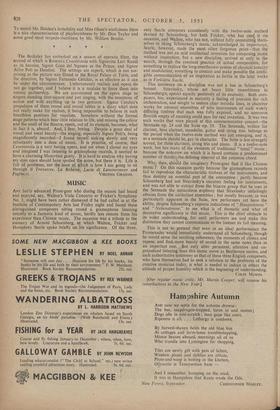MUSIC
ANY fairly advanced Prom-goer who during the season had heard and enjoyed, say, Walton's Viola Concerto or Fricker's Symphony No. 1, might have been rather dismayed if he had called in at the Institute of Contemporary Arts last Friday night and found these distinguished composers sitting round a gramophone listening intently to a fantastic kind of music, hardly less remote from his experience than Chinese music. The occasion was a tribute to the memory of Arnold Schoenberg, at which Walton, Fricker and Humphrey Searle spoke briefly on his significance. Of the three, only Searle composes consistently 'with the twelve-note method devised by Schoenberg, but both Fricker, who has used it on occasion, and Walton, who has not, without fully committing them- selves to liking Schoenberg's music, acknowledged its importance. Searle, however, made the most often forgotten point—that the method was not an arid intellectual invention for composing music without inspiration, but a new discipline, arrived at only in the search, through the constant practice of actual composition, for something to replace the long-overthrown system of classical tonality and modulation, something to contain and make possible the intelli- gible communication of an inspiration as fertile in the later works as in Verklarte Nacht.
This insistence on a discipline was not a bee in Schoenberg's bonnet. Stravinsky, whose art bears little resemblance to Schoenberg's, speaks equally positively of its necessity. Both com- posers, too, experienced in maturity a feeling of aversion for rich orchestration, and sought to restore clear melodic lines, in chamber works for unusual ensembles of solo instruments of such widely differing timbres that each was fully exposed, and no sonorous flourish empty of meaning could pass for real invention. It was two such works that were played at this commemorative concert—the Serenade op. 24 and the Suite op. 29. The Serenade, written for clarinet, bass clarinet, mandolin, guitar and string trio, belongs to the period when the twelve-note method was just emerging, and is, as a serenade should be, gay in character. The Suite is less strangely scored, for three clarinets, string trio and piano. It is a twelve-note work, but has many of the elements of traditional " tonal " music ; because the note-row on which it is based contains a predominant number of thirds--the defining interval of the common chord.
Why, then, shotild the imaginary Prom-goer find it like Chinese music ? On this occasion partly because the gramophone records fail to reproduce the characteristic timbres of the instruments, and thus destroy an essential part of the conception ; partly because Schoenberg had not Stravinsky's uncanny feeling for instruments, and was not able to extract from the bizarre group that he uses in the Serenade the miraculous euphony that Stravinsky unfailingly obtains from the unlikeliest ensembles ; but mostly because, as was particularly apparent in the Suite, few performers yet have the ability, despite Schoenberg's copious indications of "Hauptstitinne " and " Nebensthnme," to see what is of thematic and what of decorative significance in this music. This is the chief obstacle to its wider understanding, for until performers see and make this distinction they cannot communicate to the listener its full meaning.
This is not to pretend that even in an ideal performance the Promenader would immediately understand all Schoenberg, though he would sense the resulting coherence, the moments of climax and repose, and find, more beauty of sound in the same notes than in an imperfect one. But only after persistent, attentive and un- prejudiced listening does this music move as Beethoven moves, and such authoritative testimony as that of these three English composers, who have themselves had to seek a solution to the problems of the creative musician today, is what is needed to induce in others the attitude of proper humility which is the beginning of understanding.
COLIN MASON.
[Our regular music critic, Mr. Marlin Cooper, will resume his contributions in the New Year.]





















































 Previous page
Previous page